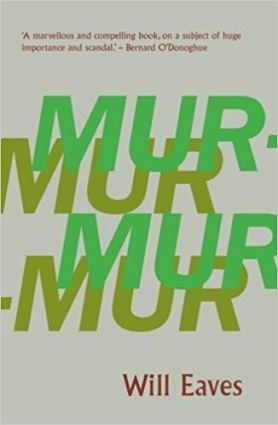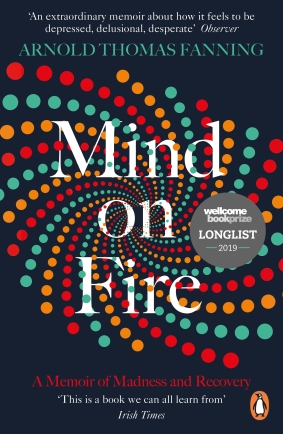
Will Eaves’s short novel, Murmur, is loosely linked to the life of the mathematician Alan Turing, best-known for inventing the machine that cracked German codes during the Second World War, and for undergoing forced chemical castration after one of his homosexual encounters was discovered, and thereafter, committing suicide. (Turing is fictionalised here as ‘Alec Pryor’, but the link is obvious.) The novel is bookended by two short sections very distinct in style from its much longer middle. The first, originally a short story shortlisted for the BBC National Short Story Award 2017, describes, in a journal entry, the liaison with working-class Cyril that led to Pryor’s punishment. The second, even shorter, depicts Pryor conversing with ‘the council of machines’, who tell him that he is losing his mind. Playing with ideas about AI, the council of machines claim that they have been fully aware from the start, through all the suffering of the Industrial Revolution, and so Pryor need not think that the painful consciousness of humans is a unique burden. Both of these sections are breathtakingly good; Eaves’s prose is beautifully direct, and the odd links Pryor makes in the second section are not necessarily logical, but still connect up perfectly well.
Unfortunately, I found the bulk of Murmur, which sits between these two bits, virtually unreadable. Eaves tries to convey what the inner workings of Turing’s mind might actually have been like while he was undergoing hormone treatment and descending into an altered state, and the results are highly irritating. Most of the novel consists of either dream sequences or letters that are ostensibly addressed to a person but are really letters to the self – two of the devices I most hate in fiction. As I also struggle with novels that are completely detached from reality, it’s no surprise that I didn’t get on with this. Even in this section, there are some beautiful passages, such as when Pryor recalls swimming in a lake with schoolfriend Christopher – but these are swiftly interrupted by another cluster of references, doublings, and psycho-analytical allusions.
I’ve been trying to work out why I find this kind of experimental literary fiction so offputting, as I’m certainly not averse to experimental literary fiction in general. There are a number of possible reasons. First, it strikes me, like a lot of postmodern literary criticism, as being more clever than wise; rather than striving to say things in the simplest way possible, it seems to delight in obtuseness. Unlike, for example, Anna Burns’s Milkman, the style isn’t working hard in service of what the writer wants to say but is getting in the way. Secondly, I think what really interests me in fiction is how humans respond to external and internal conflict, particularly if ethical, their complex relationships with other human beings, and how they think these through; when a narrator’s mind is this distanced from itself, there’s no such rational conflict, even if you could argue that conflict is still happening. Thirdly, I guess I’m unconvinced that this is the only way novels can push boundaries; it seems to me that within a more realist mode there are still hugely interesting things to be done, and I’d rather read books that are working in that direction.

In contrast, I found Arnold Thomas Fanning’s Mind on Fire, a memoir of living with bipolar disorder, much more engaging than I’d expected, although his writing is more humdrum than Eaves’s. Fanning suffered severely from mania and depression for ten years, wrestling with his own delusions, and at his lowest point, spending a winter homeless on the streets of London. I think what worked for me about Mind on Fire is that Fanning is recounting it from a position of stability – apart from a brief, necessary section at the beginning, there’s no attempt to actually try and capture his state of mind on the page. This memoir gives the reader important insights into the experience of living with serious mental illness, and I also liked the way Fanning handled his account of his own childhood and adolescence in Ireland. While there are a number of factors that may have contributed to his poor mental health – the early death of his mother, a difficult and distant father – he doesn’t attempt to draw neat causal lines between the two, but simply presents what he remembers. Fanning’s honesty throughout the entirety of this memoir is courageous and creditable.
However, I still felt that this memoir could have had a greater impact if it had been structured differently. Like many memoirs of physical illness – Porochista Khakpour’s Sick comes to mind – Mind on Fire becomes inevitably repetitive, as Fanning continually presents himself to hospitals and becomes a psychiatric in-patient, is discharged, has a period of good health, and then starts to spiral into manic depression again. Moreover, the memoir ends rather abruptly, with only a few pages given over to Fanning’s recovery, and how he’s dealt with bipolar disorder long-term. It seemed to me that both these problems could have been solved if Fanning had compressed the period of his illness somewhat, and spent more time on the period after he ‘turned the corner’. Records of emails and letters, in particular, felt to me like Fanning was doing the very necessary work of piecing together this period in his life for himself, but I wasn’t sure that all this detail needed to be in his published narrative. A great resource for those who want to learn more about bipolar disorder, or perhaps for those living with it themselves, but not an outstanding memoir.
Thanks to Rebecca for passing on her copy of this book.
I know bits were obtusse and difficult, but I still really enjoyed Murmur. I thought the letters were to his not-fiancee – Turing continued to be close to her even though he didn’t go through with marrying her – but I may have read it wrongly! I’ve just finished Mind on Fire, and agree with everything you say!
LikeLiked by 1 person
I’m not sure about the letters – while I was reading, I thought the same as you, but the final letter seemed to suggest that these letters hadn’t been sent. Or maybe this was only the case with the final letter? I don’t have the book to check!
LikeLike
Me neither, had to take it back to the library!
LikeLiked by 1 person
I ended up enjoying Murmur a lot more than on my first attempt (Part I plus a skim of the rest). I’ll be putting together a review for the Wellcome blog tour. I think Eaves does suggest at the end that the letters remained unsent, although they were addressed to a real person, Alec’s former colleague and fiancee — but there are a few from her, too, so I don’t know if those are imagined or meant to be ‘real’ documents. I’ll double check that before I write my review!
It sounds like we’re all on the same page with Mind on Fire so far. I do find this to be a perennial problem with chronic (mental) illness memoirs — the content inevitably becomes repetitive, and the memoir suffers for it.
LikeLiked by 1 person
Ha, so Annabel and I are kind of both right 🙂 Look forward to hearing your take for the blog tour.
LikeLike
Thanks for passing on Mind on Fire – I’m going to start reading it this weekend. I’m intrigued by Murmur which I also haven’t read yet. It sounds like an interesting premise but not sure if I will get on with the style of the narrative. Like you, I tend to lean towards realist prose!
LikeLiked by 1 person
No problem! I’m still trying to work out what exactly it is I struggle with in books like Murmur, as I just finished Freshwater, which I liked a lot, but obviously isn’t ‘realist’. I think it might be because Emezi sets up this existential struggle between the different spirits that inhabit her protagonist, which feels real in a kind of Greek myth way, rather than abstract/psychoanalytical.
LikeLike
Pingback: Wellcome Book Prize reading #6: Madness and Recovery – Annabookbel
Pingback: Wellcome Book Prize Blog Tour: Will Eaves’s Murmur – Bookish Beck
Pingback: Wellcome Book Prize 2019: Shortlist Events and Award Ceremony | Laura Tisdall